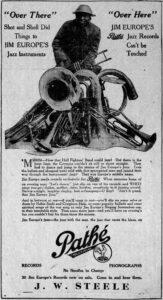YOUR DAILY DOSE OF EUBIE!!!!
Before leaving to serve in World War I, James Reese Europe’s band was signed to Pathé Records to make a series of recordings. Sissle joined the group as its vocalist for the group’s recordings in spring 1917 in between attending training camp with Europe’s regiment. Among the numbers he recorded was the song “Good-night Angeline,” written with Blake and Europe; a sentimental ballad, the song remained in the Sissle and Blake repertoire for decades. On the 22nd of June 1917, Sissle and Blake signed a separate deal with Pathé. Royalty statements for the duo were issued for three numbers—“Good Night, Angeline,” “He’s Always Hanging Around,” and “Mammy’s Little Cho’late Cullud Chile”–for sales from October 1917 to July 1919. The recordings sold well on their initial release, with each of the first two titles selling about 2400 copies and the third doing nearly 1000, but then the numbers dropped to the low 100s for the remainder of the reported periods.

In addition to recording with Sissle, Eubie recorded on his own in fall 1917 with three 78s issued in 1918 under the name of The Eubie Blake Trio. The group featured Blake and an unknown second pianist (possibly pianist Elliott Carpenter who had also worked with Jim Europe’s band and would remain a lifelong friend of Eubie’s) as well as a barely heard percussionist (perhaps Buddy Gilmore, the percussionist from Europe’s band). Another possibility is that the drummer was the comedian/vocalist Broadway Jones, with whom Blake said he was performing in New York during the war years. (Jones became Blake’s performing partner in the later ‘20s and early ‘30s.) The description in Pathé’s catalog makes it sound like they were a regular performing unit:
The Eubie Blake Trio comprises an organization of three extremely clever colored musicians whose talents in entertaining the “400” and ultra-fashionables of N.Y.C,. are extremely in favor and much sought after. As exponents of “jazz” and “ragtime” piano, two of its members are “King Pins.”….The two selections …afford fine opportunity for display of real “down south” ragging both on the piano and in the drummer.
In all, three selections made that day can be definitively attributed to Blake and his trio, the novelty song “Sarah from Sahara” (composed by Hugo Frey and published in 1918) and two novelty rags, “American Jubilee” (written by Tin Pan Alley composer Edward B. Claypoole in 1916, with snippets of bugle calls and patriotic melodies like “Yankee Doodle” thrown in for good measure) and “Hungarian Rag.” All were marketed by Pathé as fox trots for dancing.
On “Hungarian Rag,” a novelty written by Julius Lenzberg in 1913, one pianist plays the steady bass part while the second pianist handles a highly ornamented part in the upper keyboard, including many fast scale flourishes. Judging from Blake’s recordings made a few years later, it is likely that Eubie was playing the upper part that is more prominent than the lower accompaniment. Just as when he cut piano rolls a few years later, Eubie may not have selected this piece to record, but rather was responding to the producer’s needs for a popular item. For this reason, there’s not much distinctive about the playing here beyond what would have been heard from other novelty pianists of the period, such as Zez Confrey. It is interesting to note, however, that the piece features a descending, harmonized progression in its first part; Blake used a similar figure in his own compositions of the period.